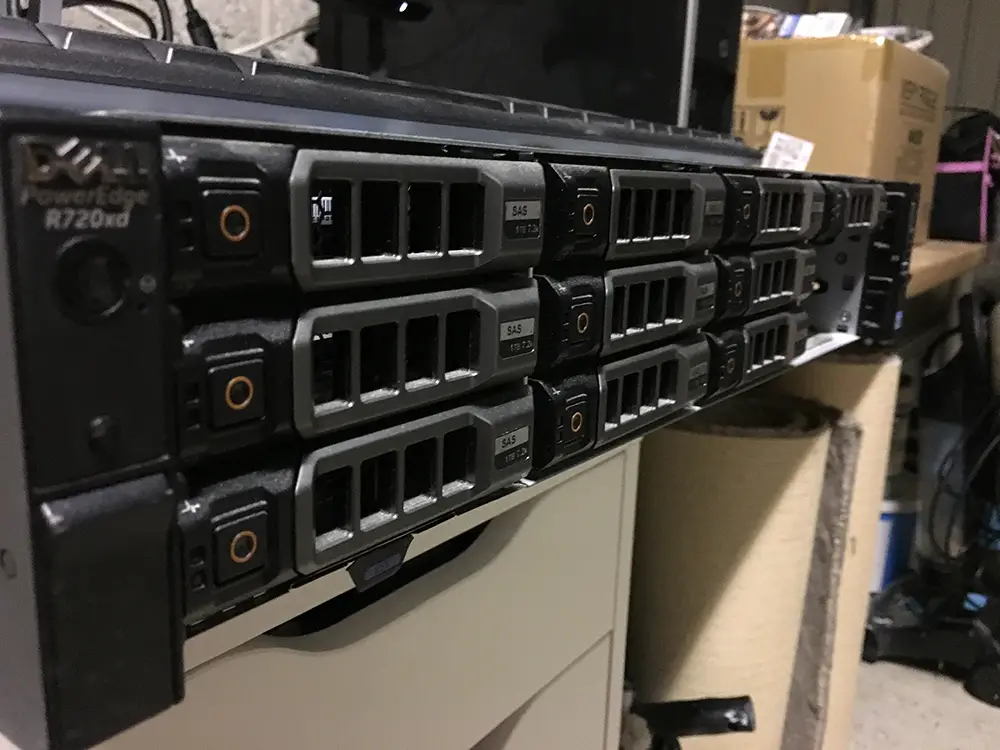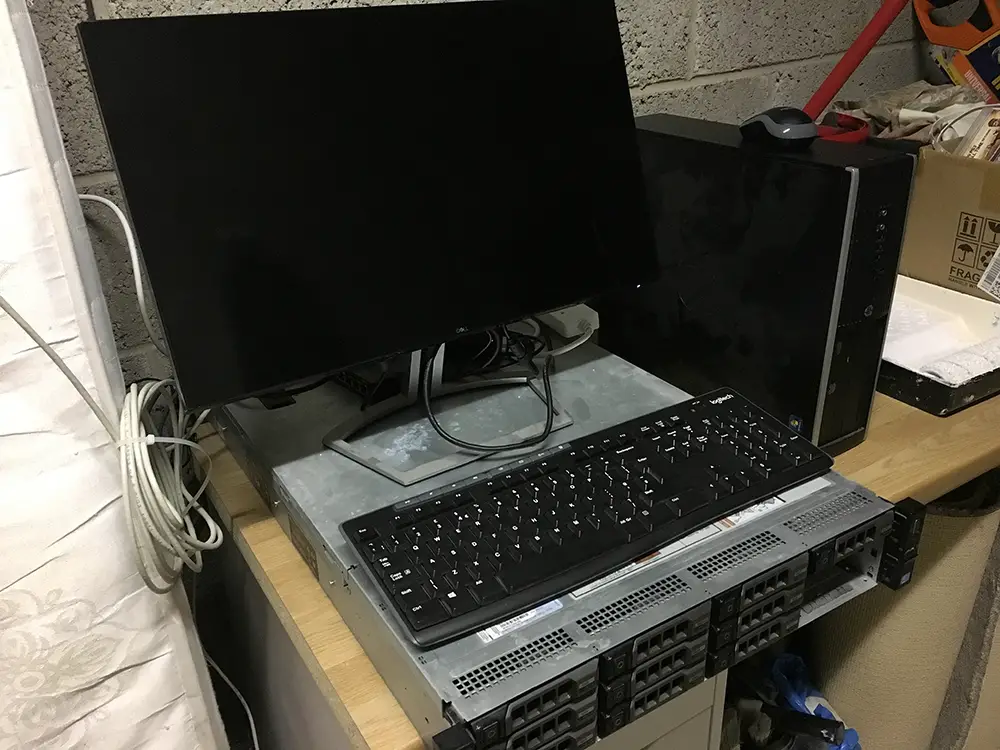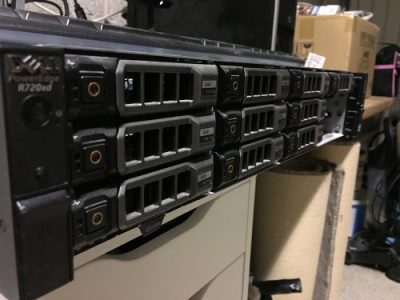Affiliate Disclosure: As an Amazon Associate I earn from qualifying purchases.
There is much debate as to whether setting up a home server is worth it for the cost, time, and effort it will take to get up and running.
Here are 7 benefits of having a home server and why you may want to consider setting one up on your home network. Some you may already know such as their ability to take the load off your main PC, but they are also not as expensive as you may think.
1. Provides a Central Location to Store Your Media
Take your typical family and you’ll find media files, be it music, video or photos, scattered all over the place.
Some will simply be left on the desktop of one laptop, whereas others may be stored on an external hard drive buried at the bottom of a drawer.
As more and more media gets added, it becomes increasingly difficult to manage it all, often leading to frustration when you are unable to find that one file you are looking for.
Another issue can be the size of the media.
Take a movie for example. These can be several gigabytes in size so it’s not surprising how storage devices become full very quickly if you have many of these high-quality video files.
Chances are, you have duplicate copies of these files across different devices, too.
Storing your media on to a central home server gives you confidence that the media still kept on an individual device can be removed as the server is the home for the master copies.
This will not only free up valuable storage space but also help take the stress out of media management.
Storing your media on a home server is convenient for the whole family and a much more efficient way of managing your media.
You may also like: Best NAS for Home Media Streaming: Buyer’s Guide

2. It Is Always Switched on and Available
I’m sure you’ve experienced powering up your PC or laptop just wanting to jump into watching a movie or playing a game.
That’s not much of an ask, is it?
You power on your device and wait for it to boot. Then you find it having to run multiple anti-virus scans, and just before you think you can hit play, you are told that updates need to be installed.
We’ve all experienced the frustration of having to wait when we just want to jump in and start something. If it cannot be done quickly, many of us will lose patience and just not bother.
The benefit of having a home server is that it is always powered on and available for immediate action; there will be no waiting for that long boot and start sequence to finish.
That is, of course, unless you choose to power down your home server.
3. Takes the Load off Your Main PC
Let’s continue with the example of wanting to watch a movie.
Playing these large video files will usually consume a lot of the processing power of your device and require continuous use of the hard disk.
Trying to play a movie on your main computer will result in it becoming less response, and possibly even overworked depending on its specification.
Not really ideal when you want to perform some productive work at the same time.
Instead, use your home server and let that do all of the work required to playback the video, leaving your main workstation’s resources ready and available for the other work you wish to throw its way.
4. Provides a Platform for Home Automation and Security
A home server can be considered the perfect platform for a home automation system.
Similarly to storing your media files on a home server, using it for home automation provides a central place of controlling all our smart devices, be it lighting systems, heating, and cooling, or even outdoor watering systems.
Regardless of whether your devices are controlled with a physical remote, an app, or are even completely automated, having it all configured and managed from a home server makes for a convenient way of managing your smart home.
In addition, a home server is excellent for monitoring purposes.
This could include storing the audio and video, which as you now know can get to be quite big, from a baby monitor or home security camera for example.
If you really go all out with your smart home, your home server could be used to log data from some smart devices, such as a rain sensor attached to the outside of your home.
If you are looking to use a home server as your home automation and security platform, there are factors to consider in order to implement an effective system.
You want to make sure the device you use as your server is always on and able to perform both its control and monitoring tasks, so it needs to be reliable and be able to cope with remaining powered on and working for long periods of time, if not 24/7.
Also, you ideally want to use a device with minimal energy needs given how long it will be powered on for.
Not only will this save you money on your energy bills in the long run, but it will also be more environmentally friendly.

5. Isn’t as Expensive as You May Think
A common misconception when the term “home server” gets mentioned is that it needs to be a very large, very heavy and often very noisy physical server you would expect to see in a data center.
This couldn’t be further from the truth as a home server can be a regular old computer that is simply dedicated to performing a certain task and serving a particular need.
No need for it to be kept in an expensive air-conditioned cupboard; a home server can simply sit quietly behind your TV if you would prefer.
Despite the cost to purchase a computer declining, they still remain relatively powerful; even the most budget computers would be suitably used as a home server.
Continuing with the example of wanting a home server to store your media files, there are a couple of important factors to consider when choosing a computer to use as your server.
The first is that it must be quiet.
The last thing you want is for the computer to be positioned near the TV when all you can hear are the fans spinning loudly.
Thankfully, most modern computers are designed and built with noise output in mind, so this shouldn’t be too much of a worry.
Additionally, depending on the age of the TV you wish to play the media on, the computer may need a composite video output.
It is unlikely that the computer you are looking to purchase has a composite output as many will now come solely with an HDMI or DisplayPort output.
You may need to also invest in an inexpensive video card that does include composite video output, or simply an adapter to give you the connectivity you need.
Remember, if wanting to use your home server for home automation and security instead of media file storage, you will ideally want a computer with low power requirements, which in turn will also aid with noise levels.
Here is a summary of what the computer you intend to turn into a home server should be and have:
- Small and compact: makes for easier and more convenient storage
- Quiet operation: to not detract from the experience when watching movies
- Low power requirements: to save money on your energy bills and be more environmentally friendly
- Built-in wireless: for a more convenient setup and to provide portability
- Connection options: to allow you to connect current TVs and other devices whilst also future-proofing
- Large storage capacity: to store all of your files and data in a central location and not need to keep upgrading
- Inexpensive: for most people, a budget computer will work perfectly as a home server
6. An Effective Backup Solution
I know you’ll have heard it time and time again, but I will take a moment just to reiterate how important it is to have backups of your data.
Should your hardware fail, you could potentially lose years of valuable data that simply cannot be recovered.
To combat this, you should always have a backup solution in place that is easy to use and automated wherever possible.
If your solution involves manually copying files from several different locations, chances are you will soon get fed up with this mundane task and simply not do it.
Ideally, you would have a backup solution that includes both an offsite and onsite backup.
An offsite backup is considered to be anything where the data is kept somewhere other than your physical location. Often this will be a cloud-based storage provider such as Microsoft’s OneDrive, Google’s Drive or DropBox as just a few examples.
This is the most common form of offsite backups, particularly for home users like you and I.
Corporate environments may for-go these services and opt for a specialist third-party online backup provider, particularly if they have a large amount of data that requires dedicated storage and monitoring.
For an onsite backup, many will continue to use the tried and tested method of backing up to USB drives, a larger external hard drive, or a NAS.
Running a home server for your backups can be considered a better option than these more commonly used onsite backup methods as they are more customizable, easier to automate and can actually be cheaper, especially if you already have an old computer to use as a backup server.
That being said, compared to using a NAS, setting up backups on a home server can be more complicated and time-consuming to perform the initial setup. Also, depending on the hardware used for the server, it could work out to be more expensive.
7. A Chance to Test, Tinker, and Play
One of my personal favorite benefits to having a home server is the ability to set up virtual machines (VMs).
Depending on the hardware used within the server, it is possible to build multiple virtual machines that all have different specifications, different operating systems, and different use cases.
Perhaps you have an application that can only run on an older version of Windows, or you are looking to have a play with a different operating system such as Linux. Maybe you simply want a virtual machine for the purposes of testing a new application before installing it on your main computer in case it breaks anything.
This is all possible by setting up virtual machines on your home server.
Should something break on one of your virtual machines, you can simply delete it and start over. This isn’t always possible with a physical computer, yet you still get the same experience on a virtual machine as if you were using a dedicated piece of hardware sitting on your desk.
If you are looking at hosting multiple virtual machines on your server, it is worth considering the specification of the server itself as virtualization does require more storage, memory and processing power.
You may find that the old laptop you have gathering dust in the bottom of the cupboard simply isn’t capable of hosting more than one or two virtual machines, so just something to bear in mind.
Conclusion
I hope you found this article useful and you may now be considering having a go at setting up your own home server.
I thoroughly enjoyed setting up my home server which I use for multiple tasks. It is a dedicated server you would typically see in a corporate environment and has plenty of storage, memory and processing power that I can allocate for different tasks.
That’s not to say you need one of these servers, though. As we discussed above, an old PC that you have lying around could well make a perfect home server for you, especially if you are looking to perform some simple tasks such as using it for storing media or having a play with a different operating system.
